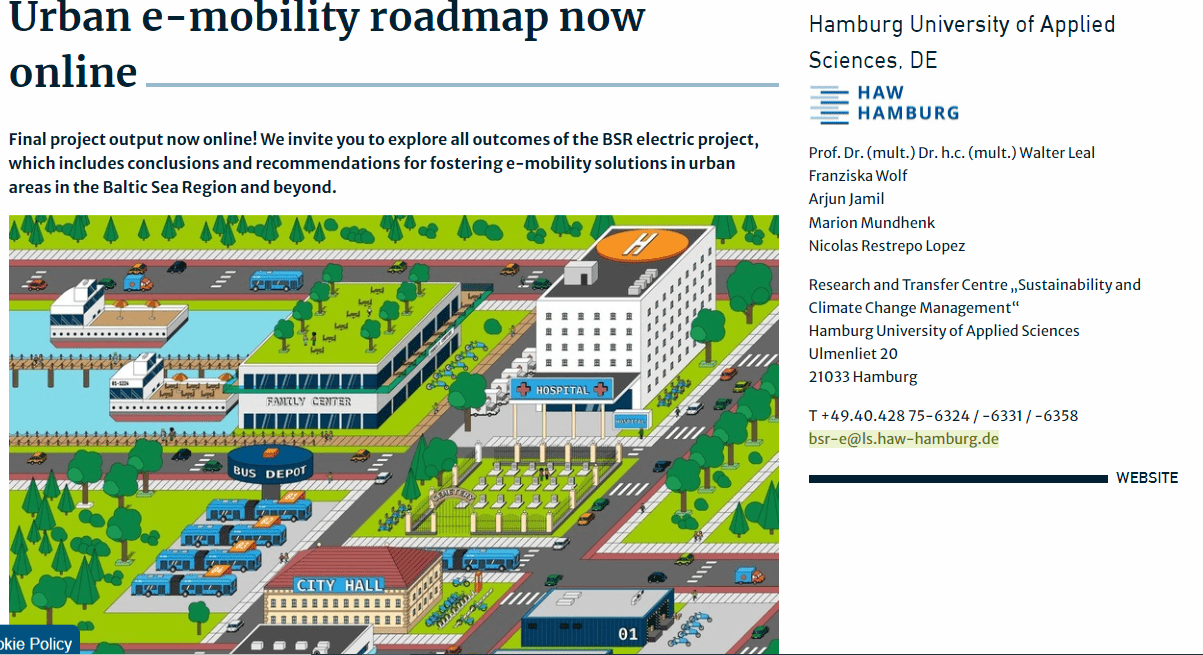BSR electric
The cities in the Baltic Sea region are growing and driving economic development. At the same time, the cities are big polluters, being responsible for the CO2 and other greenhouse gas emissions. The more extensive use of various electric mobility solutions e.g. e-logistics, e-bikes, e-buses, e-scooters, and e-ferries, would help the cities to tackle the challenges and contribute to a greener region.
However, as the know-how in the application of the electric mobility solutions among urban transport planners and decisionmakers is still limited and fragmented, more needs to be done to improve the situation. More insights into how to strengthen institutional capacities concerning electrification of urban transport are needed.
The project aimed to enhance the use of electric vehicles in city transport systems such as public sector fleets, public transport and bike sharing in order to reduce CO2 emissions and pollution. The public authorities, business, academia and NGOs from eight countries across the Baltic Sea region wanted to explore the potential of e-bikes, e-buses, e-ferries and other e-vehicles, as well as how to integrate e-mobility into urban transport strategies.
Budgets
in numbers
-
3.83MillionTotal
-
2.79MillionErdf
-
0.00MillionEni + Russia
-
0.13MillionNorway
Achievements
The gained knowledge matters
The project BSR electric has increased the knowledge of decision-makers concerning the potential of e-mobility solutions in urban transport systems. The knowledge gained has been further diversified in various ways in the participating institutions and their networks. The project targeted public administrations, public and private fleet managers, municipal companies, public and private transport operators, and other stakeholders interested in sustainable technological options and feasible solutions to integrate e-mobility into the urban transport system.
A variety of activities
The project´s pilot activities (seven use cases) have outlined how different e-mobility applications can be implemented in urban areas. The use cases provided model solutions, i.e. convincing evidence, for fostering the implementation, replication, and upscaling of the selected electric transport solutions. The lessons learned not only guided public authorities, companies, planners, and transport providers in the process of integrating the solutions into urban transport strategies but also contributed to transnational networking and learning. The project summarised all the achievements in an intuitive interactive manner on the results page. The interactive city map, being featured on the page, resembles a part of the “Baltic Sea Region Roadmap for Urban E-Mobility” and embeds the project's use cases in the context of the urban transport system of a Baltic Sea region city. The project BSR electric inspired and raised awareness of feasible solutions to transform cities into more liveable places.
Stimulating investments in electric vehicles and charging infrastructure
Besides, the project BSR electric strengthened the ability to attract new financial resources, i.e. stimulating investments into urban electric transport solutions. The project closely collaborated with the decision-makers on a set of means and ways to finance urban e-mobility solutions.
Outputs
Theme-specific recommendations
- E-Vans and e-Logistics - Action Checklist for Municipalities, local and national Politicians
- E-Buses - Action Checklist for Municipalities and Public Transport Providers
- E-Bikes - Action Checklist for Municipalities and Companies
- E-Scooters - Action Checklist for Municipalities and Organizations
- E-Ferries - Action Checklist for Municipalities
Online learning module on urban e-mobility applications
Baltic Sea Region Roadmap for Urban E-Mobility

Project Stories
-
03.08.2021
Low-carbon mobility solutions to green our future
In line with the EU’s climate neutrality target, our Programme supported several initiatives tackling the diverse challenges faced by the Baltic Sea region’s transport sector. We united our efforts to make our region more accessible, better connected and less polluted, ultimately improving the overall mobility experience in the area while protecting the environment. Read how Interreg Go LNG, BSR electric and Sohjoa Baltic have contributed to green mobility and innovation in transport sectors in the region.Read full story
Partners
Hamburg University of Applied Sciences
- TownHamburg
- RegionHamburg
- CountryGermany
- RepresentativeWalter Prof. Dr. Leal
- Phone
- E-Mail
- Web
ATI Küste GmbH Association for technology and innovation
- TownRostock
- RegionRostock, Kreisfreie Stadt
- CountryGermany
- RepresentativeAlexander John
- Phone
- E-Mail
- Web
Høje-Taastrup Municipality
- TownTaastrup
- RegionKøbenhavns omegn
- CountryDenmark
- RepresentativeLasse Altmann
- Phone
- E-Mail
- Web
Lindholmen Science Park AB
- TownGothenburg
- RegionVästra Götalands län
- CountrySweden
- RepresentativePeter Öhman
- Phone
- E-Mail
- Web
Zero Emission Resource Organisation (ZERO)
- TownOslo
- RegionOslo
- CountryNorway
- RepresentativeTorfinn Belbo
- Phone
- E-Mail
- Web
Turku University of Applied Sciences
- TownTurku
- RegionVarsinais-Suomi
- CountryFinland
- RepresentativeKatariina Kiviluoto
- Phone
- E-Mail
- Web
Green Net Finland
- TownHelsinki
- RegionHelsinki-Uusimaa
- CountryFinland
- RepresentativeIlkka Aaltio
- Phone
- E-Mail
- Web
Helsinki Region Environmental Services Authority HSY
- TownHelsinki
- RegionHelsinki-Uusimaa
- CountryFinland
- RepresentativeLeena Mikkonen-Young
- Phone
- E-Mail
- Web
Institute of Baltic Studies (IBS)
- TownTartu
- RegionLõuna-Eesti
- CountryEstonia
- RepresentativeMerit Tatar
- Phone
- E-Mail
- Web
Tartu City Government
- TownTartu
- RegionLõuna-Eesti
- CountryEstonia
- RepresentativeJaanus Tamm
- Phone
- E-Mail
- Web
LTD Ardenis
- TownRiga
- RegionRīga
- CountryLatvia
- RepresentativeArtūrs Dombrovskis
- Phone
- E-Mail
- Web
Riga City Council
- TownRiga
- RegionRīga
- CountryLatvia
- RepresentativeTimurs Safiulins
- Phone
- E-Mail
- Web
City of Gdansk
- TownGdańsk
- RegionTrójmiejski
- CountryPoland
- RepresentativeMonika Borkowska
- Phone
- E-Mail
- Web
Urban Transport Administration Gothenburg
- TownGothenburg
- RegionVästra Götalands län
- CountrySweden
- RepresentativeMichelle Coldrey
- Phone
- E-Mail
- Web
WITHDRAWAL (30.06.2019) Free and Hanseatic City of Hamburg, Borough of Bergedorf
- TownHamburg
- RegionHamburg
- CountryGermany
- RepresentativeChristoph Lindemann
- Phone
- E-Mail
- Web
-
Project managerWalter LealThe Research and Hamburg University of Applied Sciences, Transfer Centre Sustainability nad Climate Change Management (abbreviation: FTZ-NK)
-
Legal representativeMicha Teuscher, Prof. Dr.Hamburg University of Applied Sciences
-
Financial managerSilke KuehlHochschule für Angewandte Wissenschaften Hamburg
-
Communication managerFranziska WolfParfeniukHamburg University of Applied Sciences



